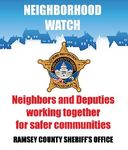Block Captain News - January 2021 - Ramsey County
←
→
Page content transcription
If your browser does not render page correctly, please read the page content below
Ramsey County Sheriff’s Office Neighborhood Watch
Bob Fletcher, Sheriff
Public Safety Services Division – Crime Prevention Unit
1411 Paul Kirkwold Drive • Arden Hills, Minnesota 55112
Phone: 651-266-7339 • Fax: 651-266-7337
www.RamseyCountySheriff.us
Neighbors and Deputies working together for safer communities
Block Captain News – January 2021
Happy New Year! In this issue:
Gift card scam awareness
The members of the Sheriff’s Office are looking forward to a great year Thin ice
ahead with the hopes that we can put the challenges of the previous Operation Income Illusion
year in the rearview mirror. We learned a lot about resiliency this past Not Reaching pouch
year as the world dealt with the pandemic and the impact felt in our Neighborhood Watch explained
individual lives and our communities. While true that we don’t know
exactly when the pandemic will end and what our normal will look like when it does, we are hopeful that our
isolation will end and we can interact in face to face contact with others in our community.
Our hope in the Crime Prevention Unit is that we will be able to resume our in-person block captain
meetings, Coffee with a Cop, community events, Night to Unite and more. Stay tuned and we’ll all get
together in our new normal 2021, where the mission is making our communities more safe.
New tools introduced to fight gift card scams.
Year-round, gift cards are on scammers’ wish lists. Scammers always have a
reason for you to pay them immediately with a gift card. And they often tell
you which card to buy and which store to visit. That’s why the FTC launched a
new Stop Gift Card Scams campaign to work with stores and law enforcement to fight these scams.
At ftc.gov/StopGiftCardScams, you can find materials to help people avoid gift card scams. If you’re a retailer
(or even if you visit one), you can download, print, and share these materials in your store and community.
You’ll find a display rack sign, cashier infographic card, bookmark, and a sticker. Stop Gift Card Scams is also
available in Spanish.
This is pressing because the FTC’s data show that, nationwide, gift cards are a top way that people report
paying most scammers. People tell the FTC that, since 2018, they’ve paid almost $245 million to scammers,
with a median loss of $840. In December, the FTC released an updated Data Spotlight with some interesting
new developments:
• Reports suggest eBay is scammers’ current gift card brand of choice. It was Google Play and iTunes, but
eBay has claimed the uncoveted top spot
• People most often report using gift cards to pay scammers pretending to be the government, a business,
tech support, or a friend or family member in trouble.
• People report that scammers tell them to buy gift cards at Walmart, Target, CVS, and Walgreens. And
once they have you there, they’ll keep you on the phone as you pay for the gift cards.
Which brings it full circle back to the Stop Gift Card Scams campaign. Read lots more in the Spotlight itself,
and find out more about avoiding gift card scams at ftc.gov/giftcards. And if anyone, no matter who it is, tells
you to pay with a gift card, that’s a scam. Stop, don’t pay, and then tell the FTC at ReportFraud.ftc.gov.Skating on Thin Ice – more than just a ‘mom saying’
The 20-21 winter season has been ‘interesting’ as we started with snow and cold for Halloween; near tropical
conditions for deer season and Thanksgiving; brown lawns and smooth ice without snow in December; a
blizzardly white Christmas; and warm weather conditions providing questionable ice conditions on our area
lakes and ponds as we start the new year.
During the Christmas-News Years holiday
period multiple reports of vehicles and
people breaking thru the ice were received
throughout Minnesota.
Safety first
The recommended minimum thickness for
walking on new, clear ice is 4 inches. Wait
for 5 to 7 inches before heading out on an
ATV or snowmobile and keep cars off until
there’s 8 to 12 inches. Anyone planning to drive out in a truck, should wait until there’s at least 12 to 15
inches of ice. Double these minimums for white or snow-covered ice.
• Wear a life jacket or float coat on the ice (except when in a vehicle).
• Carry ice picks, rope, an ice chisel and tape measure.
• Check ice thickness at regular intervals; conditions can change quickly.
• Bring a cell phone or personal locator beacon.
• Don’t go out alone; tell someone about trip plans and expected return time.
• Before heading out, inquire about conditions and known hazards with local experts.
If you see someone fall through, remain calm and call 911. Do not attempt a rescue unless there is a means
of self-rescue. Throw the person any piece of buoyant gear available, as well as a rope, jumper cables or
other object to pull them out of the water or away from thin ice. Let go if they start pulling you toward
dangerous ice.
February holiday preview – with a word of caution
The month of February is host to a day to recognize romance and those that are special in
our hearts. Valentine’s Day is appreciated by our neighborhood florists, chocolatiers, card
makers, apothecaries and for some, a time of commitment anxiety.
Many have profiles on online
dating sites, apps or social
media to find “the one.”
Please exercise caution with
that interesting person who
just messaged you – it could
be a sweet-talking romance
scammer looking for your
cash.
Please remember it’s not
true love if they ask for
money.
Ramsey County Sheriff’s Office, Crime Prevention Unit – Block Captain News – January 2021 Page 2What’s trending? Investment Coaching & Income Scams
“You’ll make a lot of money. It’s easy to do right from your own home. I’m going to show you how to
do it – and using my program and system I guarantee your success!”
When you see these claims in an ad – there’s likely a scammer behind it. In mid-December the Federal Trade
Commission joined federal, state and local government partners to roll out “Operation Income Illusion”, an
effort to fight income scams and help people recognize and avoid them. With record unemployment and
the ongoing financial impact of the pandemic, many people are looking to make ends meet — and
scammers are pitching income scams with false promises of success and financial security.
In a typical pitch, scammers will say that you can make a lot of money, for example, working from home with
little time and effort, or starting your own online business. But those promises of big money are all an
income illusion. In fact, in the first nine months of 2020 alone, people reported to the FTC that they lost at
least $150 million. The total amount of alleged
injury for the FTC income scam cases is over $1
billion. Income scams hit people hard.
Sometimes these scammers focus their pitches
on particular communities, reinforcing that
people in every community need to be on the
alert for income scams. In one case, a work-
from-home scam targeted Latinas through
Spanish language TV ads. In another case, an
alleged investment scam affected older adults,
retirees, and immigrants. And in yet another
case, the FTC found servicemembers, veterans,
students, and college-age adults targeted with
a business coaching scam.
When the FTC analyzed customer data from
some of the cases, it was found that in income
scams where the average loss was less than
$500, people who lost money were 44% more
likely to live in majority Black communities.
You can spot income scams if you know the
scammers’ tactics.
Before you pay for a program that promises to
help you invest your money, consider these
things:
• Statistics and testimonials can be faked.
Scammers want you to believe their program is
always successful and low risk.
• Scammers exaggerate the press of time. They want you to feel pressured to commit now without doing
research on the offer.
• No one can guarantee a specific amount of return on an investment. Scammers might claim that you
can make thousands of dollars per day or per month for life, but no one can actually guarantee that an
investment will be successful.
And if you know the signs of an income scam you can avoid it and help others avoid it, too. If you spot an
income scam, report it at ReportFraud.ftc.gov.
Ramsey County Sheriff’s Office, Crime Prevention Unit – Block Captain News – January 2021 Page 3Tool to help drivers and cops during traffic stops
A traffic stop is often the first interaction that a citizen has with law enforcement. The officer doesn’t know
who you are beyond any information via the license plate. The first thing the officer is looking out for is his or
her safety. A driver should turn off the car, roll down the window, stay inside the car and put their hands on
the steering wheel, or at least make it clear that there is nothing in their hands and they are not reaching for
anything. Never reach under your seat.
Always carry proper identification: a valid driver’s license, current proof of insurance, and proof of vehicle
registration in some states. Do not retrieve or reach for documentation until instructed.
To remedy the confusion on what documents
are needed and how to provide them to a
police officer during a routine traffic stop a
South Carolina mother invented a pouch that
mounts on a vehicle’s air vent/dash to hold
the documents in plain view. The pouch is
available online at
https://www.notreaching.com for $10. It also
is available with messaging for drivers who are
deaf, autistic, or licensed to carry a firearm.
Remember: as with all valuables – do not
leave this pouch and contents in your vehicle
unattended.
Reminder: don’t leave your vehicle running, unlocked and unattended. Don’t
make it easy for thieves to drive it away while you’re “away for just a moment”. Spread the word. Stop thefts.
Neighborhood Watch is about Neighbors and Deputies working together
Involved neighbors are more likely to have open communication lines with each other,
deputies, and the whole community. When neighbors know each other’s names,
normal patterns, and look out for each other, it is likely that they will report any activity
that doesn’t fit with regular schedules. Involved neighbors look out for each other.
Information sharing on crime prevention, crime trends, and law enforcement issues is a
key element to the Neighborhood Watch program of the Sheriff’s Office.
Neighborhood Watch program information and forms to help your block organization
are available on the county website. Please complete and return the Block Captain
registration form to ensure the Sheriff’s Office has your most current contact
information. THANKS!
Thank you for working for safer neighborhoods!
@RamseyCountySheriff @RamseySheriff @RamseySheriffMN
Deputy Mike Servatka Randy Gustafson
Crime Prevention Specialist Crime Prevention Coordinator
651-266-7339 651-266-7315
email address: CrimePrevention@co.ramsey.mn.us website: www.RamseyCountySheriff.us
Remember – when you See Something, Say Something, Call 9-1-1
Ramsey County Sheriff’s Office, Crime Prevention Unit – Block Captain News – January 2021 Page 4You can also read



























































